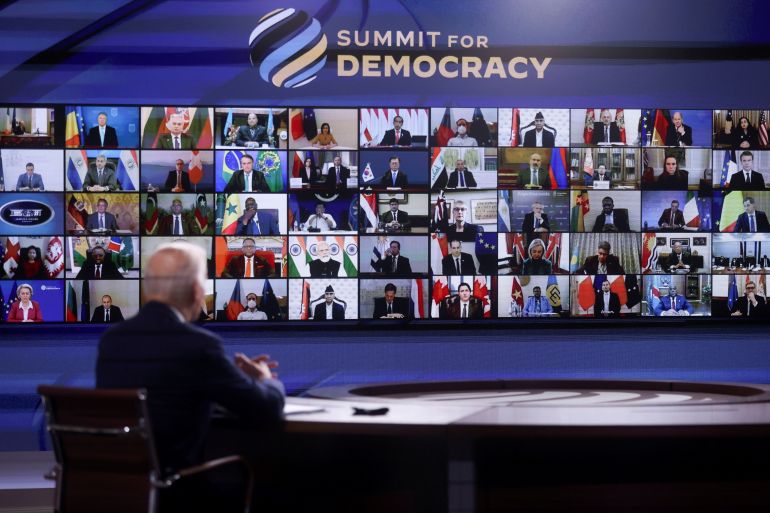Biden urges world leaders to ‘lock arms’ to safeguard democracy
The two-day virtual White House summit involves 111 leaders from diverse and sometimes discordant governments.

US President Joe Biden has gathered over 100 world leaders at a summit and made a plea to bolster democracies, calling safeguarding rights and freedoms in the face of rising authoritarianism the “defining challenge” of the current era.
He urged leaders to “lock arms” to strengthen democracies and demonstrate their worth.
Keep reading
list of 3 itemsHow Democracy Dies
Biden invites Taiwan to upcoming ‘Summit for Democracy’
The White House billed the two-day virtual event starting on Thursday as an opportunity to reassert democratic values amid a global backslide. The summit gathered 111 leaders from diverse, and, at times, discordant governments, as well as civic society and private sector figures, to take part in a “year of action” to make domestic and global reforms.
The administration has said a second summit in 2022 will serve as a global progress report.
“We stand at an inflection point in our history. The choices we make in my view in this moment, are going to fundamentally determine the direction our world is going to take in the coming decades,” Biden said on Thursday.
“Will we allow the backward slide of rights and democracy to continue unchecked? Or will we together, together have a vision … and courage to once more lead the march of human progress and human freedom forward.”
The summit follows a tumultuous year in US democracy that began with an attempt by former President Donald Trump and his allies to overturn the results of the 2020 presidential election, crescendoing in the deadly storming of the US capitol on January 6 by Trump supporters in an attempt to stop Congress from certifying Biden’s election.
Biden’s attempt to claim the mantle of leadership in democracy promotion amid a continued backslide in trust in the democratic institutions at home sits awkwardly for some observers.
Addressing the summit on Thursday, Biden said his administration will “keep fighting to pass two critical pieces of legislation that will shore up the very foundation of American democracy”, but offered few details in how he would assure the federal legislation, which remains stalled in the US Congress, will be passed.
‘Cold-war mentality’
Critics have also said the invitation-only event risks heightening ideological divisions at a time when global cooperation on a slew of pressing issues – notably climate change, public health, and nuclear non-proliferation – remains paramount.
China and Russia have particularly targeted the event, with their ambassadors to the US, in a joint essay in the National Interest policy journal, accusing the Biden administration of exhibiting a “Cold-War mentality” that will “stoke up ideological confrontation and a rift in the world”.
Beijing, which has been particularly enraged over the US’s inclusion of self-governing Taiwan at the event, has embarked on a public relations campaign highlighting the US’s struggles to maintain trust in its democratic institutions, claiming to have a “democracy that works”, despite being a one-party state with no free media or independent judiciary and what critics decry as a “rubber-stamp parliament”.
Biden, without naming countries or leaders specifically, pushed back on that criticism on Thursday, saying that “autocrats” are seeking to “advance their own power, export and expand their influence around the world and justify the repressive policies and practices as a more efficient way to address today’s challenges”.
He added they “seek to fan the flames of social division and political polarisation … by increasing the dissatisfaction of people all around the world with democratic governments that they feel are failing to deliver for their needs.”
Still, the event’s guest list has sparked criticism of divisiveness, with questions arising over why some countries were left off the list and others with questionable right records were included.
NATO-ally Turkey and European Union member Hungary were both excluded, with Hungary since attempting to block EU Commission President Ursula von der Leyen from speaking on behalf of the bloc at the summit.
Meanwhile, Pakistan and the Philippines received invitations, despite the US State Department saying both governments are responsible for “unlawful or arbitrary killings”.
On Wednesday, the White House said the invitation list did not indicate a “stamp of approval or disapproval”, but instead sought to include diverse voices.
Kimberly Halkett, Al Jazeera’s White House correspondent, said that – given the authoritarianism of many of the countries participating in the summit and the US’s own problems, such as racial injustice – it would be a challenge to agree on an actionable joint statement from the summit.
“[Biden] believes that the US, while flawed, is still the best model of democracy and hopes to lead by example,” Halkett said.
“This is the challenge for the US president. He is moving forward, he is making the case that this can be worked on collectively, even as he acknowledges rather humbly that the US has its own flaws,” Halkett said.
The gathering comes as several prominent international observers continue to warn that democracies are increasingly threatened around the world.
In its new annual report released on Wednesday, CIVICUS Monitor, a global rights index, said 13 countries saw their civic freedoms downgraded in 2021 from the previous year. Only one, Mongolia, saw civic freedoms improve, according to the report.
Of the 197 countries graded by the group, only 39 were rated as open societies.
Another group, the International Institute for Democracy and Electoral Assistance, said in its annual report that the number of democracies in backslide “has never been as high” as the past decade, with the US for the first time added to the list alongside India and Brazil.